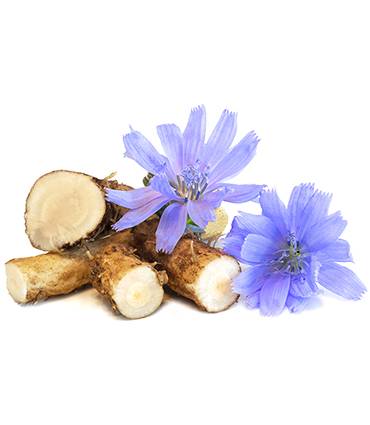Chicory

Latin name :
Cichorium intybus L.
Common Name :
Chicory
Family :
Asteraceae
Origin :
Europe, Asia, North Africa, North America
Part of the plant used :
Root
Description
Chicory, often used as an alternative to coffee, is a herbaceous plant of the Asteraceae family, just like daisies. The ancient Egyptians and Greeks used chicory for its medicinal properties.
Used in phytotherapy, chicory root acts as a prebiotic by nourishing the good intestinal bacteria thanks to the presence of inulin, a water-soluble fibre of the fructo-oligosaccharide class (FOS). It thus facilitates transit, particularly in cases of mild constipation and digestive disorders.
In addition, this plant is also composed of flavonoids with antioxidant properties. It thus helps to fight against oxidative stress caused by free radicals, known for their involvement in the process of cellular ageing.
Thanks to its composition in minerals such as phosphorus and iron, but also in vitamins, including the antioxidant vitamin E, vitamins K and B9, chicory root is an asset for the proper functioning of cells and an anti-carcinogenic ally.
Moreover, the sesquiterpene lactones, also called "bitter principles", present in chicory root are responsible for its draining activity on the body. Both depurative and draining, it contributes to the evacuation of toxins from the liver and also promotes appetite.
Chicory also has depurative and diuretic properties while protecting the stomach. It acts at the level of the liver and the gall bladder by promoting the production of bile (choleretic effect) and its expulsion towards the gall bladder (cholagogue effect), thus facilitating digestion.
The benefits
Chicory supports liver health and detoxification systems, promotes digestion and improves digestive comfort. This plant also contributes to normal urinary and renal elimination functions.
Scientific publications
Chicory is teh subjectof more than 900 scientific publications.
- Azpiroz, Fernando et al. “Effect of Chicory-derived Inulin on Abdominal Sensations and Bowel Motor Function.” Journal of clinical gastroenterology vol. 51,7 (2017): 619-625.
- Lightowler, Helen et al. “Replacement of glycaemic carbohydrates by inulin-type fructans from chicory (oligofructose, inulin) reduces the postprandial blood glucose and insulin response to foods: report of two double-blind, randomized, controlled trials.” European journal of nutrition vol. 57,3 (2018): 1259-1268.
- Nishimura, Mie et al. “Effects of the extract from roasted chicory (Cichorium intybus L.) root containing inulin-type fructans on blood glucose, lipid metabolism, and fecal properties.” Journal of traditional and complementary medicine vol. 5,3 161-7. 20 Jan. 2015.

























